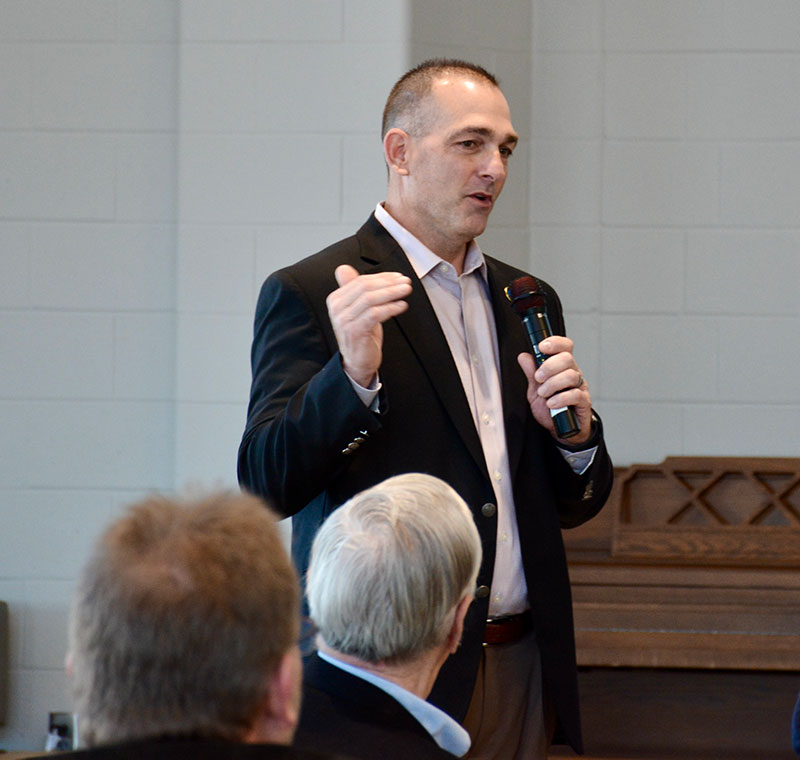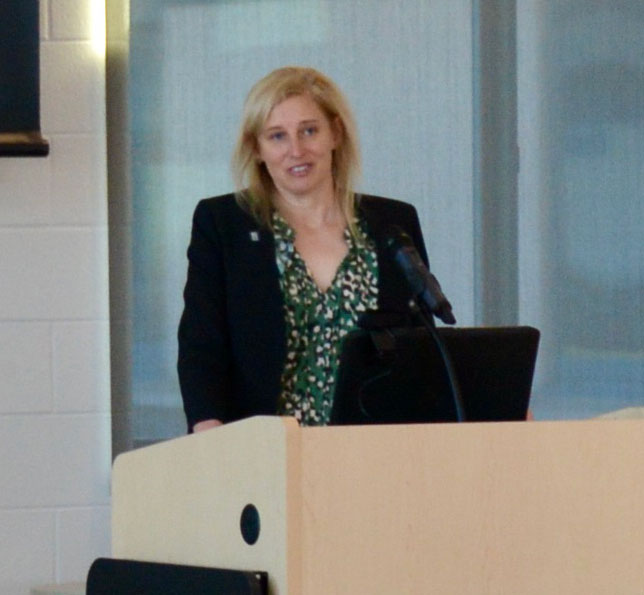Adult learners have been a primary focus of Caldwell Community College and Technical Institute since its founding in 1964. Fifty-eight years later, CCC&TI is joining a partnership to re-energize that focus and help the local adult population acquire valuable training and credentials beyond high school.
“We have a lot of underskilled and underemployed people in our community that could really benefit from coming back to school to learn a new skill or earn a credential or degree,” CCC&TI President Dr. Mark Poarch said. “This is a direct, intentional effort to reach out to students 25 and older and to re-engage them in what we have going on at CCC&TI.”
Representatives from CCC&TI, the John M. Belk Endowment, myFutureNC, as well as local government, business and education leaders from Caldwell and Watauga counties gathered on CCC&TI’s Watauga Campus in Boone Friday morning for the initiative’s local launch. The event also included a facilitated discussion on how to accomplish the project’s goals as well as gather ideas and input from local leaders.
The NC Reconnect campaign, a joint effort by the John M. Belk Endowment and myFutureNC, was launched in June 2021 in collaboration with Blue Ridge Community College, Durham Tech Community College, Fayetteville Tech Community College, Pitt Community College and Vance-Granville Community College. The next phase of the initiative adds five more colleges: CCC&TI, Wilkes Community College, Lenoir Community College, Forsyth Technical Community College and Central Carolina Community College.

CCC&TI President Dr. Mark Poarch speaks at Friday’s NC Reconnect launch.
The goal is to connect and inform as many adults as possible about the colleges’ variety of fast, flexible and affordable education and training programs.
John M. Belk Endowment President and Board Chair MC Belk Pilon told the audience that an estimated 1.3 million adult North Carolinians lack the post-secondary skills and credentials that today’s employers are seeking. She lauded the North Carolina General Assembly and Governor for efforts in 2019 that led to the NC Reconnect project.
Pilon was followed by myFutureNC President and CEO Cecilia Holden, who shared that two-thirds of the jobs in North Carolina require some level of education after high school and about half of North Carolinians have the level of education needed to fill those jobs.
“We have a lot of work to do,” Holden said, adding that if no action is taken, North Carolina is projected to fall about 400,000 workers short of what the state will need by 2030. “A systemic and strategic approach to engaging our adult learner population is going to be very important.”
Higher Education Consultant Mike Krause, former head of the Tennessee Higher Education Commission, told the group that the number of adults with post-secondary training is a key factor in economic development efforts.
“North Carolina is in a dog fight for economic development projects,” Krause said. “If you are in the manufacturing sector, if you are in the logistics or the supply chain sector, you are looking at how many people have done anything beyond high school. And the way that economic development is evolving … you don’t even get the meeting to discuss tax incentives if you don’t have the right number of people with something beyond high school.”

John M. Belk Endowment President and Board Chair MC Belk Pilon speaks at Friday’s NC Reconnect launch .
“Reaching adult learners in this area is an economic imperative,” Krause said.
Much of the focus of NC Reconnect will be on special outreach tactics to reach adults who have completed some college, but never finished, through special events, targeted advertising and customized tactics geared toward adults ages 25 to 44.
NC Reconnect will provide a variety of resources and funding to CCC&TI as part of the project.
“We have a lot of opportunities for growth,” Poarch said, adding that the college’s foundation also will contribute funding to help with tuition, childcare, transportation and other expenses that serve as obstacles for adult learners.